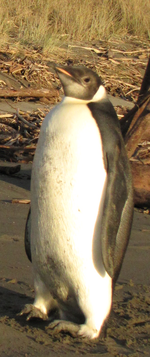Emperor penguin offered free berth back to Antarctica
Updated on 25 June 2011
The economist, Gareth Morgan, who is leading an expedition to the icy continent , has offered the bird, nicknamed Happy Feet , a spot on a Russian icebreaker when it leaves in February.

The emperor penguin turned up on a Kapiti Coast beach.
PHOTO: DOC / Richard Gill
He says in the meantime the penguin will have to be cared for in Wellington.
Penguin in critical condition
The penguin is in a critical condition at Wellington Zoo following a second operation to remove sand from its system.The rare visitor from Antarctica was taken to the zoo's hospital on Friday from Peka Peka beach on Kapiti Coast, where it was first spotted earlier in week.
It had become increasingly distressed and had been eating sticks and sand, in place of the snow it would normally consume.
Vets had on Friday cleared sand from its oesophagus, but x-rays showed more in its stomach. At the time they gave the penguin a 50% chance of survival.
Vets have been able to pump water inside the penguin's stomach on Saturday to flush out a handful of sand, but they say about eight to ten handfuls still remain.
The vet science manager, Lisa Argilla, says they will now let Happy Feet rest for a day and probably try again with the same procedure on Monday.
She says the worst case scenario is surgery but that would be potentially dangerous for the penguin, so vets are hoping they won't need to operate.
Ms Argilla says the longer the sand remains inside the penguin, the more life-threatening it is.
As many as 100 people gathered at the operating theatre on Saturday to watch through the glass as the procedure was carried out.
The penguin's appearance so far from its home has also gained international attention with coverage by media in America, Australia, Britain, China and Canada.
The last recorded sighting of an emperor penguin in New Zealand was at Oreti Beach in Southland in 1967.
Emperor penguins are the largest of the penguin species. Adults can grow to more than a metre tall and weigh up to 30kg. They feed on fish, krill, squid and a wide range of marine invertebrates and hold the diving record at 450 metres deep and 11 minutes underwater.
Source


















No comments:
Post a Comment